Cultivating a garden — have you ever tried your hand at tilling the land? If you have, I applaud you. Personally, I haven’t gotten into the whole farming thing. Sometimes, I have the urge to, especially when I write about flourishing in Eden. There’s something about stepping outside and getting dirt under your fingernails, smelling the sun on your burnt skin, squinting at the sky and shielding your eyes to cover the seeds that are waiting to be buried… it really get’s you thinking about what life means. It makes you slow down.
That’s a convenient segue into the third part of this Eden series, which has been a long time in coming. I wanted to talk about slowing down. This increasingly pervasive topic about slowing down, slow living, intentional living, etc., whichever you like to call it, has steadily been growing in my own mind as well. With the topic of Eden so constantly in my mind and my intentions in pursuing that in my daily, I have come to realize the act of slowing the pace of our lives is nearly impossible in today’s utilitarian and efficiency based culture. The West is all about convenience, modernity, progress, and that ugly word again: efficiency. How I have come to despise the consumeristic view of efficiency. Efficiency used to be about a progress or methodology being improved so that it could be done with the highest quality in mind. Now, it’s just about output.
John Mark Comer’s book, entitled The Ruthless Elimination of Hurry, has been transformative the past three or four months as a part of my journey transitioning to slow-paced living. As a young Generation Z woman, I am fully immersed and aware of the slow living Pinterest life. Here’s a collage of what slow living on Instagram, Pinterest, TikTok, and the rest seems to appear to be to the world online:
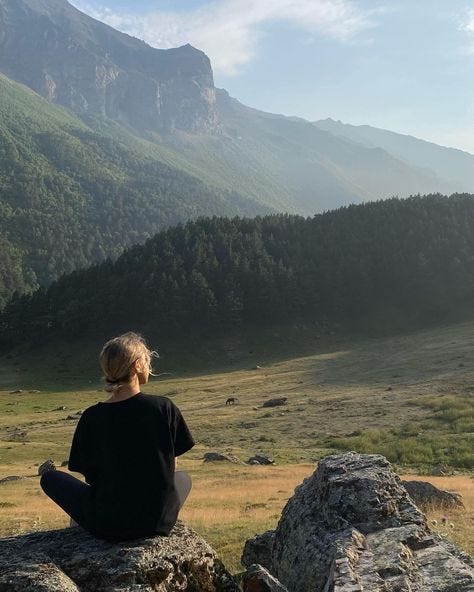

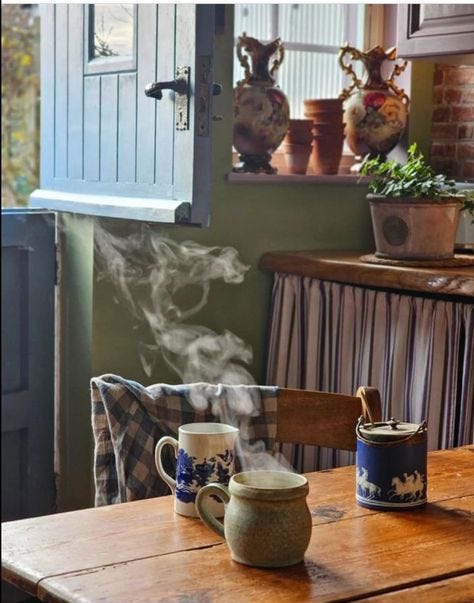
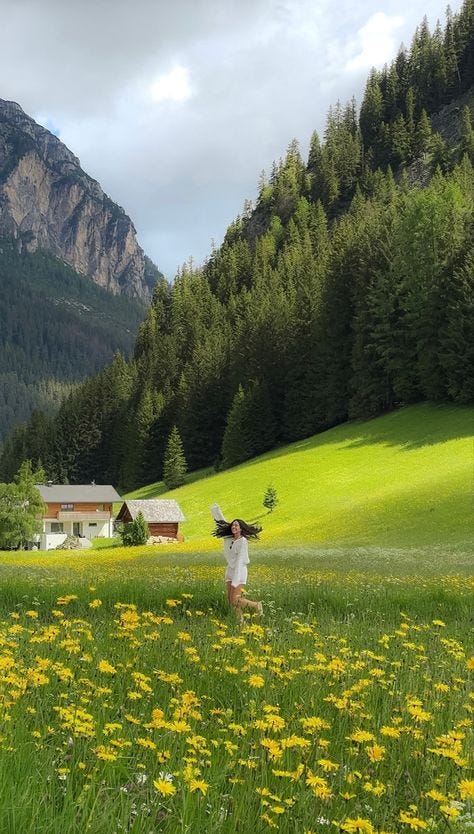
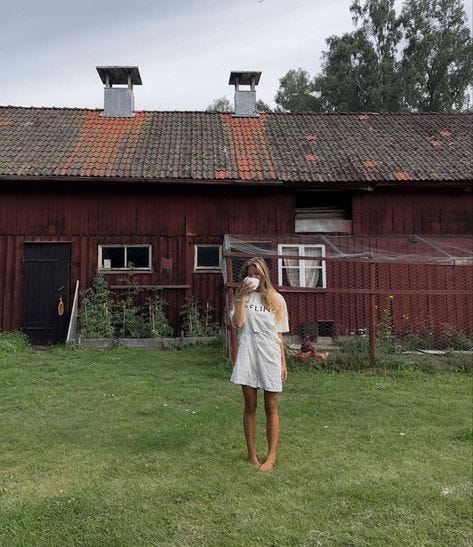
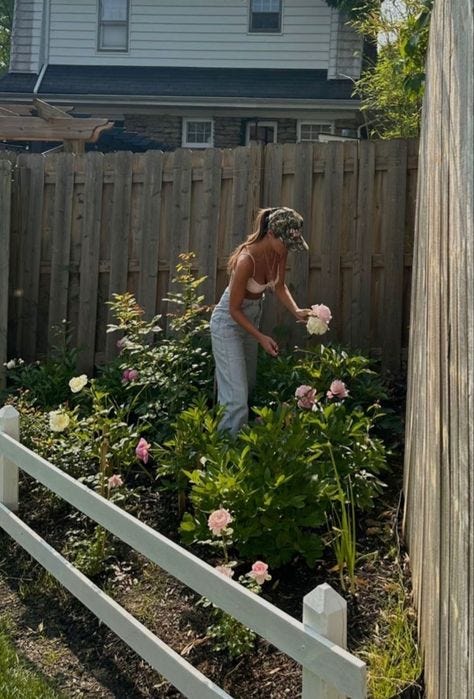
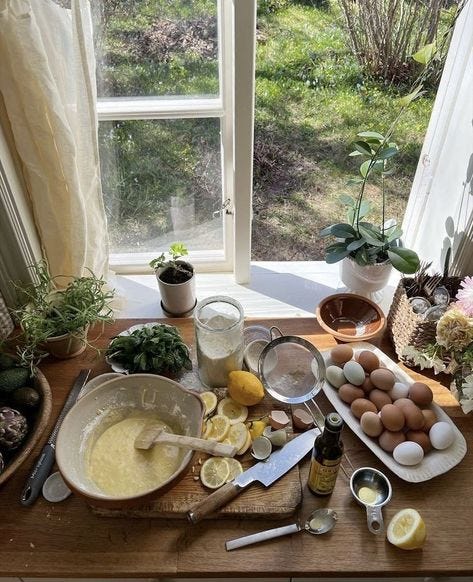
Look, I’m obsessed with Pinterest aesthetics as the next girl. It’s not like I avoid curating a life I enjoy. I actually think that pictures communicate more than words do at times. They communicate belief, beauty, art, design, feeling, musings, etc. They are a manifestation of something that is created. All of these photos inspire me to live a life of quiet ease and slow experiences that mean more than fast fashion and a fifty hour work week.
Comer makes some really fantastic points in his book, though, that can only add to these ideas that are so much deeper than an aesthetic moodboard:
“Because what you give your attention to is the person you become. Put another way: the mind is the portal to the soul, and what you fill your mind with will shape the trajectory of your character. In the end, your life is no more than the sum of what you gave your attention to. That bodes well for those apprentices of Jesus who give the bulk of their attention to him and to all that is good, beautiful, and true in his world. But not for those who give their attention to the 24-7 news cycle of outrage and anxiety and emotion-charged drama or the nonstop feed of celebrity gossip, titillation, and cultural drivel. (As if we “give” it in the first place; much of it is stolen by a clever algorithm out to monetize our precious attention.) But again: we become what we give our attention to, for better or worse.”
There’s more to life than beautiful imagery and fantastic views. There’s more to cultivating a garden planted in freedom. And when we obtain Freedom — ahh, then we can begin.
Below, I want to outline some ways that I personally have begun cultivating in my own life. But this isn’t about being a fundamentalist (even though I’ve considered that my views seem to be leaning that way… although in this age, anyone who says ‘thank you’ or opens the door for a woman is a fundamentalist of some type). I don’t want to spring legalism on you. These are suggestions, some backed by Jesus from my understanding of Scripture, and others maybe not necessarily. Feel free to add your own or delete all of mine from your repertoire and create your own desired rhythms. Keep in mind too, that these ideas come from the biblical understanding of Eden and what the Kingdom of God is, which I outlined in part 1 and part 2 of this series.
Replace noise with meaningful quiet.
Noticing this issue in my own life, I began to speak with close friends on the topic. I also began to pay closer and closer attention to the larger crowd as I went about my day. Even as I sit in a coffee shop writing this, a girl and her father sit at a table and discuss what she’s scrolling through on social media. With social media and tv so prevalent in the everyday, noise is almost constant. I myself battle the urge to constantly need music playing in the background as I live. Endless sources of information stream into our conscious — and more dangerously still, subconscious — minds by the second. Every second of every day. Every day of every week. Every week of every month. Every month of every year. You get the idea. It doesn’t take a genius to look around and observe the amount of noise that surrounds most of us. And most of this noise, I would like to point out, is essentially a distraction and waste of our brain space. Most of it is actually out of control. It’s not like we can turn down the noise of a crowd or the honking of cars. But we do pay attention to the noise that we do allow in? Do we pay attention to how much noise we actively ignore? This article that I drop below is lengthy, but important, I think, to understand what I mean by ‘noise’. You might think noise isn’t too bad, but I think it might just be detrimental to the greatest minds, because in order to have a great mind, sometimes less is more.
What triggers sensory overload?
Sensory overload can be prompted by a lot of different sensations, and what triggers you might not trigger the person sitting next to you.
• Sound: Loud and persistent noises, like concert music or a cacophony of voices around you in a restaurant, could cause you to feel sensory overload.
• Sight: When there’s a lot going on around you and you can’t figure out where to look or what to focus your attention on could feel like sensory overload. Bright or flashing lights can also make you feel this way.
• Smell: Perfumes and cleaning supplies are just two of the types of scents that can feel overpowering and lead to sensory overload.
• Touch: Some people are extra-sensitive to the way certain fabrics feel. You could experience sensory overload from, say, wearing a scratchy material or donning tight or uncomfortable clothes.
• Taste: The scent, texture and even spice level of certain foods can trigger sensory overload, like if you’re eating something new to you or something very spicy.
It’s not always that simple, though. Sometimes, sensory overload occurs when multiple senses feel overwhelmed.
Imagine, for example, that you’re visiting Times Square: There are thousands of people around you, all chatting (sound) and sometimes bumping into you (touch). The heavy scent of food from street vendors wafts throughout the streets (smell), while neon lights and screens flash advertisements atop every building (sight).
Where should you look? How can you focus? Hello, sensory overload!
Sensory overload symptoms
There’s no single psychological or physiological response to sensory overload.
“When your body’s alarm system starts to go off after being triggered, it can feel different for different people,” Dr. Tworek explains.
Some common mental and emotional reactions to sensory overload include:
• A general feeling of stress.
• Anxiety.
• Confusion that can seem almost paralyzing.
• Inability to focus.
• Irritability.
• Racing or intrusive thoughts.
“It can feel like your brain is on a hamster wheel, just running away from whatever it is that you’re experiencing,” Dr. Tworek illustrates, “and your body is responding to that.” Physically, you may start to experience:
• Dizziness.
• A flushed (red) face.
• Shaking or trembling.
• Sweating.
• Tightness in your chest.
“Once those senses are triggered, it almost feels like the ball starts rolling and it becomes a snowball effect,” she continues. “It grows and grows until it becomes overwhelming.” If it goes unchecked, sensory overload can even lead to a panic attack.1
We are enslaved to noise. We are enslaved to the amount of ‘free’ information we have at the tips of our fingers. I think that we do not grasp the import of this. I do not think that we see quite incredible that is. Imagine the first men who walked earth looking at the stars, tracking constellations and hunting in the depths of the sea and scouring plains for wild beasts to feast on. Now, we order on Uber Eats and pull out GPS. We had no idea, then, what was happening across the ocean. We paid attention to what was immediately around us.
In a small way, I can see Jesus enforcing this principle when he overturned tables and drove out sellers with their wares out of His house in John 2. This passage reveals who Jesus claimed to be, that He had the authority to preside over what happened at the temple. Not only this, but he was also in the process of eradicating extraneous rules for those who wanted to worship. These businessmen settling in the temple courtyard were there to cash in on the ‘requirements’ the Jews had to follow in order to sacrifice to Yahweh. But here’s what I want to zero in on. Jesus valued sacred spaces. He saw the import of a place without the noise of the world invading the place of divine worship. He cared about areas of the Jewish people’s lives being specifically carved out for meditation, musing, learning, and hearing from God. How many of us can say that we do that today?
Eradicating all of the noise of the world isn’t an option or even healthy. But maybe reconsidering that podcast you listen to every time you go for a run is. Sometimes — and I know this is revolutionary — we drive without listening to something. Boom. Mind blown. It’s hard to sit in the quiet because our ears are used to running at full capacity, and along with our poor ears, our brains as well. Sometimes though, it’s necessary to put away the music, podcast, or tv show and just sit. Look out the window. Bird watch. Go for a swim with nothing but the noise of the water rushing over you. Gen Z is a tired generation. Perhaps the level of noise that pervades isn’t a helping factor.
Not only do music and podcasts contribute, but nonfiction writing as well. 2023 was the year for me grabbing off the shelf every self-help book and spiritual lifestyle piece of work out there. But there were several distinct seasons of burnout that happened, and I realized that a consistent factor was the amount of advice and extra voices I was hearing in my head about how I wasn’t do something right or the way I did it wasn’t the most efficient method. It’s a beautiful thing that we get to pick someone’s brains through reading their work. In fact, that’s what anyone who reads this is doing. But there is a balance and a limit to how much information one can take in. And the rapid pace at which publishers are throwing books at the public that will Save your life in 10 easy steps is insane. How will we ever keep up? The answer: never. Wisdom is a gift and grace from God, and perhaps we can use a little bit of it here to discern what we can handle and what we really need in our season, and what maybe can wait until we have completed and soaked in what we ought to be learning now.
Do you have a silent place? Do you intentionally carve out minutes or an hour of silence to hear God’s voice? To walk with Him in the cool of the day?
Cultivating Eden even seems to look like this in the pictures I show above.
The silence of a green valley.
Clucking chickens roosting.
Whispering wind tickling your neck.
Open plains where wildflowers dance to the song of nature.
Children pirouetting and performing tenuous somersaults.
Sweat dripping down your forehead as you lean into the dirt to clip tomatoes off the vine.
If only we could all become farmers and homesteaders again. But cultivating Eden does not have to look like a picture taken from someone else’s life or a movie scene. These simple rhythms I suggest are easy, doable, and have the power to alter how we think about the daily.
Cultivate rhythms.
I enjoy using the word rhythms. It is fluid, companionable, and easy on the tongue. It isn’t harsh, but it suggests steadiness. What is a rhythm? According to Webster: "movement, fluctuation, or variation marked by the regular recurrence or natural flow of related elements". The natural flow of related elements. How sweet those words can be to one who desires rest in the Garden. Many of us don’t really enjoy routine. We think it’s boring. We think it’s rules rules rules all day! But that is where rhythms come in. Everyone, no matter who you are or what stage of life you are living, has a natural flow to their lives. It may or may not be comfortable or healthy. It may need to be altered. And that is where the work begins. Analyzing your peace of mind, your state of being, going into work, coming home to greet the kids, walking the dog, kissing your husband/wife goodnight. What rhythmic patterns are you indulging in that create distance in relationship or bring you closer to humanity? Are there cravings you often allow to take over instead of choosing another object of affection? Maybe a morning devotional time doesn’t suit. Move it to evenings after the day’s work is done.
Whether you're a busy soccer mom, priest, single, or a retired eighty year old, we can all begin to build continuity and rhythm into everyday living. You discover which ones are meaningful to you and to your relationship with Christ by practicing various ones, and then deciding what builds up your emotional and spiritual wellbeing best. Subtract things that aren't helpful, and do lots of experimenting. Analyze various aspects of your daytime and nighttime practices, make some notes.
I like this quote taken from a Psychology Today post: “Life is full of rhythms (Kotz, 2018). There are many kinds of natural rhythms, such as when a person walks, waves at the shore, or a dripping tap. We feel deeply the cycles of sun and moon, planting harvest. The human body is replete with rhythmical processes, such as respiration, heartbeat, circadian cycles, and menstrual cycles.”2 Even nature has her rhythms. Music, poetry, energy itself, dances to a rhythm of its own. Isn’t it so likely that human beings were also made for some kind of sameness and reassurance of events?
People take time, and the only time is now.
I mention sameness, rhythms, living in tandem with the natural universe. But there are people that are part of that universe. And as with all things, people are not perfectly regulated 100% of the time. I’ve recently been learning that taking time to smile at someone in the grocery store or complimenting the barista serving you is a game changer — for yourself and for that other person. Sometimes, we are most blessed when we break out of our day to day tasks and allow for our rhythms to be flexible enough to accommodate people. We have no idea what an impact it may be to laugh with somebody, ask them (genuinely) how they are, embrace them. Simple kindness is really showing the grace of the Lord to a lost world. But you sacrifice the never-ending efficiency mindset. You shed hurry. You lose precious minutes of your twenty-four day. But what profits it a man to gain the world and lose his soul?
People are what matters. People are what Christ will inquire of us when we reach gates of the Kingdom. What we did with the image bearers around us is what transforms our own health in all of the different areas, but also transforms and plants Edenic seeds in the wilderness we inhabit. Pilgrims we are, in Exile. But maybe Exile doesn’t have to be a negative end in and of itself. Maybe there is more to the will of God than just surviving.
For myself, time is my most precious commodity. With it, I can create wealth for myself; I can attain a goal; I can heal my body; I can soak in the beauty of nature; I can write; I can do all of the things that God has crafted me to do. But if I have not love, I am a clanging symbol: no harmony and no gentleness found within. Time is a gift that ultimately does not belong to us, and it is very precious. We have so little of it, really. It seems that our time bank flows unending, but eventually the clock of mortality will run out. What will we say then, as we stand before God? Could I even stand to face myself, if I did not allow my time to be spent where God wills? Do I allow my heart to be penetrated by small kindness and humble love toward other human beings? Jesus’ time was interrupted many times by somebody who called to him. He never turned them away.
The second point I was going to make separate, but it also deals with time so I suppose I’ll include it here.
Ecclesiastes speaks copiously on time. The writer of the book says many a time to enjoy what we have when we have it. To not look to control or write the next moment, because it is a striving after the wind. “A person can do nothing better than to eat and drink and find satisfaction in their own toil. This too, I see, is from the hand of God…” (Ecc. 2:24). This one, this is a big one. Living right now right now (yes, I meant to type that twice) is becoming almost impossible in my generation. We are constantly onto the next season, stage, or phase of life. Graduated high school, onto college. Graduated college, onto the career of our dreams. Single, dating, engaged, married. Pregnant, one kid, two kids, three kids. Empty nesters. Retired. See what I mean? There is a never and ending the madness. These seasons are natural, and things are meant to come and go. But seemingly, there is this hurriedness to always achieve success and do the best you can in some other time that does not belong to us. There is a quote from Blaise Pascal that I have tucked into the pages of my Bible:
“We never keep to the present. We recall the past; we anticipate the future as if we found it too slow in coming and were trying to hurry it up, or we recall the past as if to stay its too rapid flight. We are so unwise that we wander about in times that do not belong to us, and do not think of the only one that does; so vain that we dream of times that are not and blindly flee the only one that is. The fact is that the present usually hurts. We thrust it out of sight because it distresses us, and if we find it enjoyable, we are sorry to see it slip away. We try to give it the support of the future, and think how we are going to arrange things over which we have no control for a time we can never be sure of reaching.
Let each of us examine his thoughts; he will find them wholly concerned with the past or the future. We almost never think of the present, and if we do think of it, it is only to see what light it throws on our plans for the future. The present is never our end. The past and the present are our means, the future alone our end. Thus we never actually live, but hope to live, and since we are always planning how to be happy, it is inevitable that we should never be so.”
What a sobering thought. We throw away the gift of the present, the only time that is really ours, without a second’s delay. We care no more for what is in front us than we do for what came before us. The present is quickly losing value just as much as the past is. Here are some practical steps that I have implanted in my own life to keep myself from dwelling anxiously on the future.
Allot time to dream of the future -- limited time. And then for the rest of that day, ask yourself to refocus on the moment that is the only one to exist in reality: right now.
Chant under your breath anything that gets your head out of the cloudy distant unknown and back down to earth, right now.
Limit your reading of lifestyle books, which often create a sense in us of having not yet 'arrived' at a future point, that we need to increasingly 'get better' at life in order to achieve a better future now (very confusing, I know. Sorry about that. It’s just what the world tells you, so what can I do?), when in reality, right now's right now can get better pretty quickly by us just appreciating the moment.
There are many more I can include here, but this article is long as it is, and time is a wasting.
see this link for whole article: health.clevelandclinic.org/sensory-overload



